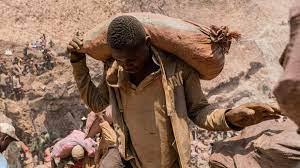
https://www.raid-uk.org/blog/workers-living-wage-drc-industrial-cobalt-m...
A new calculation for the cost of living in Kolwezi puts the monthly minimum level for the living wage at US $480 per month, an increase of $78 from the previous estimate in 2021. Global inflation and the cost of living crisis has increased the price of staple crops such as manioc and maize more than six-fold, while the price of vegetables, meat and fish increased by 50%.
“Prices for basic goods in Kolwezi markets have gone up significantly as a result of global economic turmoil, yet the wages paid to workers at Congo’s industrial cobalt mines have largely stayed the same,” said Josue Kashal, Manager at the Centre d’Aide Juridico-Judiciaire (CAJJ).
UK-based corporate watchdog RAID and Kolwezi-based CAJJ, a Congolese legal aid centre specialised in labour rights, carried out the research, applying the Minimum Expenditure Basket methodology developed by the United Nations and humanitarian agencies.
RAID and CAJJ applied the methodology in 2021 when they published the first-ever living wage calculation for industrial cobalt mine workers in Kolwezi. The current calculation takes a snapshot of the cost of basic goods and services as of January 2023.
The living wage calculation was first published as part of an in-depth report which exposed a system of widespread exploitation of Congolese mine workers at five large-scale industrial mines. Especially affected are the thousands of workers hired via subcontractors who make up 57% of the mines’ workforce. The research found workers receive very low pay and are subjected to excessive working hours, degrading treatment, violence, discrimination, racism, unsafe working conditions, and a disregard for basic health provision. According to RAID and CAJJ’s research, 63% of the contractors interviewed in 2021 and 2022 earned much less than the living wage, which was calculated at $402 per month at the time.
Congo’s industrial mines are operated by multinational mining companies, including those from Europe and China, many of which announced enormous windfall profits last year. For example, the Swiss mining giant Glencore, which operates two of the most productive copper and cobalt mines in Congo, recently announced profits of $34.1 billion, up 60% from the previous year. Glencore’s shareholders received $7.1 billion in returns.
RAID and CAJJ estimated that the annual cost of paying a living wage to the 4,874 contractors employed in 2021 at Glencore’s Katanga Copper Company (KCC) mine, its largest cobalt mine, would be less than 0.1% of the company’s profits last year.
RAID and CAJJ urged cobalt mining companies operating in Congo to pay all workers the minimum living wage, irrespective of the workers being hired directly by the mining company or indirectly via subcontractors. The groups also pressed EV companies, battery manufacturers and refiners to end contracts with cobalt suppliers who fail to take action to remedy worker exploitation.
Notes:
Glencore’s KCC mine is one of five mines studied by RAID and CAJJ. The others were CMOC’s Tenke Fungurume, Eurasian Resources Group’s Metalkol, Sino-congolaise des mines (Sicomines) and Société minière de Deziwa (Somidez). In 2021, Glencore employed 11,110 workers at its KCC mine, of which 44% were workers hired via subcontractors. If all of the 4,874 sub-contracted Congolese workers working at KCC earned the living wage of $480.37 per month, the annual wage bill at the mine would amount to at least $28 million (plus taxes and other benefits), which is about 0.1% of the company’s profits last year.
For the full copy of the calculation of the living wage and the methodology, click here. Learn more about exploitation at DRC's industrial cobalt mines here.
https://www.raid-uk.org/content/about-raid
RAID exposes corporate wrongdoing, environmental harm and human rights abuses. We partner with those harmed to hold companies to account and pursue justice and remedy. Through rigorous investigation, advocacy and the law, we work to strengthen regulation of business and bring justice for victims of corporate abuse.
What we do:
Our work pushes the boundaries of corporate accountability. As a UK-based NGO, RAID recognises that the doors to justice and remedy for the victims of corporate abuse are closed. This is especially true for communities in Africa where the power of global multinational companies and their impact on the environment is undeniable.
Based in the Global North, such multinational companies far too often infringe on the rights of local communities with little scrutiny or accountability. For those harmed, obtaining justice in local courts or in legal jurisdictions where the companies are based can seem like an impossible hurdle. We seek to change that and provide an avenue for remedy.
How we work:
Together with African-based human rights defenders and civil society groups, RAID’s team of committed and experienced professionals research corporate abuse in Africa. We trace the contours of financial and corporate webs to the jurisdictions where the companies are based.










Add new comment